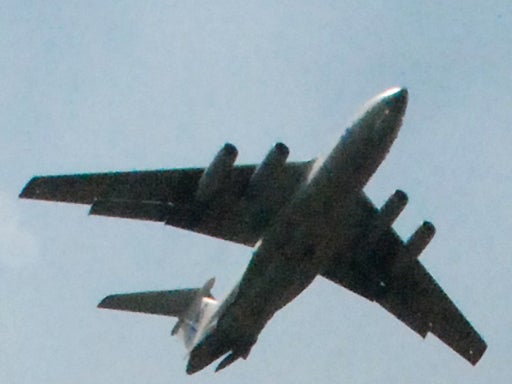Plane loads of cash: Flight records reveal Russia flew 30 tonnes of bank notes to Syrian regime
The logs show that a cargo plane belonging to the Syrian Air Force made eight round trips between Moscow’s Vnukovo Airport and Damascus over three months this summer

According to newly released flight logs, Russia has been helping out embattled Syrian leader Bashar al-Assad by literally sending him planeloads of cash.
The logs, obtained by the investigative journalism body ProPublica, show that an Ilyushin 76 cargo plane belonging to the Syrian Air Force made eight round trips between Moscow’s Vnukovo Airport and Damascus over three months this summer, each time carrying a stated cargo of 30 tonnes of banknotes.
This would suggest that a total of 240 tonnes of currency, equivalent to roughly 240m notes, made its way from Russia to Syria over the summer. Goznak, the Russian state body that prints banknotes, has confirmed that in recent months it has provided currency to the Syrian regime. In an interview with the state-controlled Rossiiskaya Gazeta last week, the head of Goznak confirmed for the first time that Russia is indeed producing currency for Damascus. “The order has already been fulfilled,” said Arkady Trachuk, Goznak’s Director, though he did not specify how many notes were sent to Syria. Around 20 countries order their currency from Russia, including Lebanon, Guatemala and Belarus.
Syria’s currency was previously produced in Austria by a subsidiary of the country’s Central Bank, but after EU sanctions were put in place last autumn, the government had to look elsewhere for its currency. During a visit to Moscow in August, Syria’s Deputy Prime Minister Qadri Jamil referred to the currency deal with Russia as a “triumph” for the embattled country over Western sanctions.
“There is a practical need for Syrian pounds to stay in circulation so that the government can keep paying the soldiers and the bureaucracy,” says David Butter, a Middle East expert at Chatham House. “If the government is simply printing money in Russia and flying it to Damascus, then the potential for hyperinflation is very strong.”
It is unclear whether all the notes aboard the planes were newly minted Syrian currency, or whether there was also some aid in the form of “hard” currency. As Syria has been engulfed in violence over the past year and a half, the government has struggled to balance the budget and allay fears of massive inflation. Syrian officials have played down rumours that the country is simply printing money that it cannot afford to, but with a black hole in the budget, this seems the most likely explanation for the flights from Russia.
“Tax collection is down and oil revenues are perhaps only 10 per cent of what they were before the conflict started,” says Mr Butter. “Even by official government figures, they are running a huge deficit.” The Syrian pound has slid dramatically this month, amid rumours that the Central Bank is running low on hard currency, causing a rush by Syrians to change their money into dollars and gold, and inflation has hit around 38 per cent.
Flights between Russia and Syria have been subject to scrutiny amid rumours that Moscow might be trying to help its old ally with illicit weapons deliveries. Last month, Turkish jets forced a plane travelling from Russia to Syria to stop at Ankara Airport and searched it, claiming that it contained weapons bound for Mr Assad’s government. Moscow responded furiously, accusing Turkey of putting lives at risk, and insisted that the plane was carrying a legal shipment of radar parts, rather than weapons. Flight logs show that the planes carrying the banknotes flew a circuitous route from Moscow to Damascus, avoiding Turkish airspace and instead transiting over Azerbaijan, Iran and Iraq.
The Russians have consistently said that they support neither Mr Assad nor the opposition, but Moscow has vetoed action against Syria at the UN and has been seen as the regime’s only major friend internationally. Russia has hundreds of millions of pounds worth of arms contracts with Syria, and although it has said it will not sign any new deals with Mr Assad, it has promised to honour what has already been agreed. Russian Prime Minister Dmitry Medvedev again criticised Western policy in Syria in an interview published yesterday, branding as “unacceptable” the French government’s recognition of the opposition to Mr Assad as the legitimate government of Syria and suggestions that it might sell them arms. “The desire to change a political regime in another state through recognition of some political force as the sole sovereign representative seems to me not entirely civilised,“ said Mr Medvedev ahead of a visit to Paris.
Join our commenting forum
Join thought-provoking conversations, follow other Independent readers and see their replies
Comments